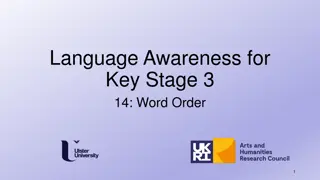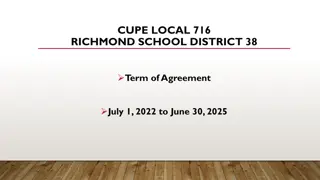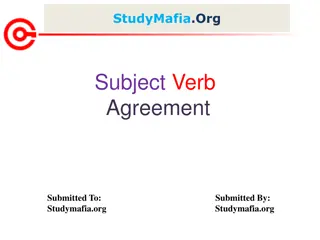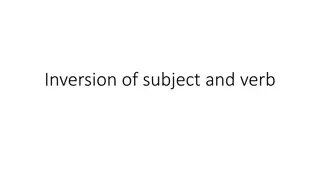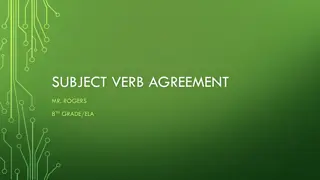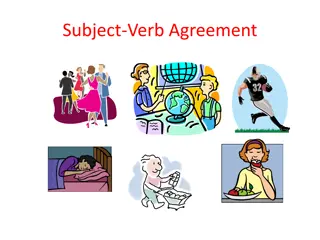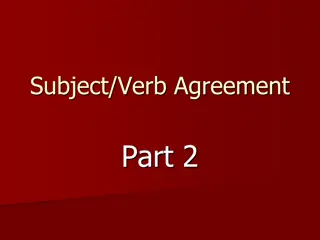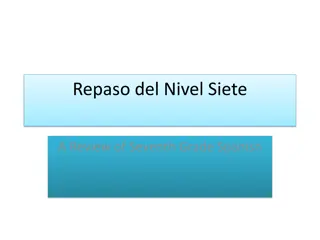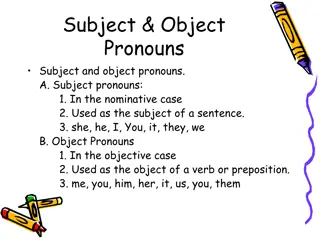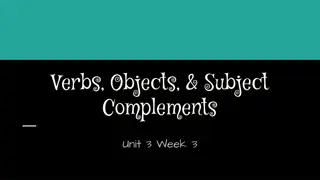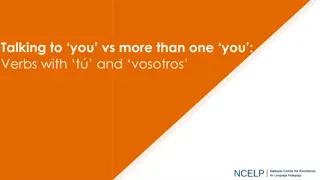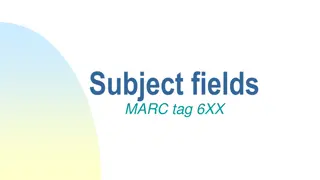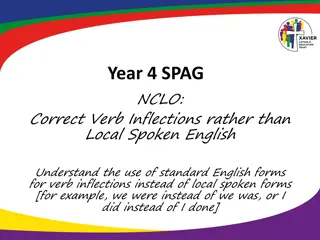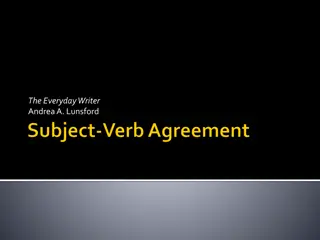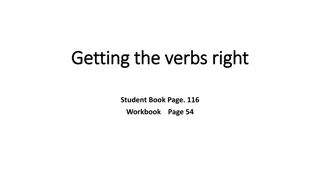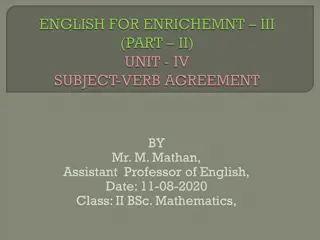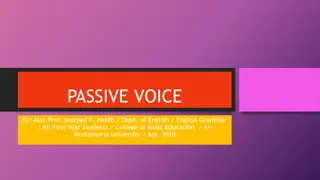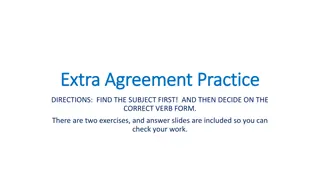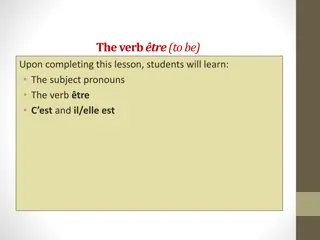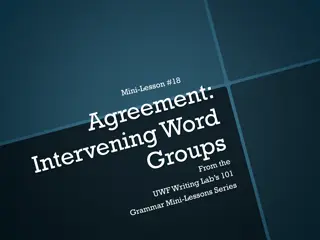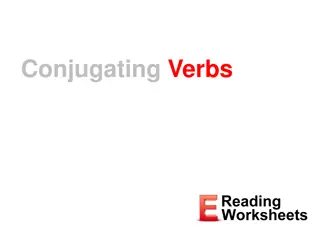Passive verb forms
Passive verb forms involve using "be" in a specific tense along with the past participle of a main verb to change the object of an active sentence into the subject of a passive sentence. The passive voice is commonly used in formal writing when the doer of the action is unknown, obvious, or purposel
2 views • 13 slides
Acceptance of Amended AFRA Agreement in Parliament: Overview
The presentation outlines the purpose, background, strategic importance, amendments, status, risks, and recommendations associated with the acceptance of the Amended African Regional Co-operative Agreement for Research, Development, and Training Related to Nuclear Science and Technology (AFRA Agreem
1 views • 12 slides
Subject/Verb Agreement Practice Exercises
Practice identifying subjects and verbs, and correcting verb agreement errors in sentences. Examples include singular/plural subjects with corresponding verbs and compound subjects. Improve your understanding of subject-verb agreement through interactive exercises.
0 views • 5 slides
Understanding Subject-Verb Agreement in English Sentences
Learn about subject-verb agreement in English sentences with singular and plural nouns, first, second, and third person examples, uncountable nouns, and exceptions where plural nouns take singular verbs. Discover how to match the verb form to the subject noun in different scenarios to ensure grammat
2 views • 17 slides
Understanding Word Order in Different Languages
Explore the fascinating world of word order in languages. Discover how different languages arrange words in various ways, such as Subject-Verb-Object (SVO), Subject-Object-Verb (SOV), and more. Delve into the diversity of word orders for subjects, objects, and verbs, and uncover how language structu
2 views • 31 slides
Collective Agreement Highlights for CUPE Local 716 Richmond School District 38 (2022-2025)
The collective agreement outlines wage increases based on the Provincial Framework Agreement for the years 2022-2025, includes updates on equity and inclusion with a focus on no discrimination, addresses para-educators' hours of work and overtime, revises standby allowances, and introduces a new pro
0 views • 34 slides
Understanding Subject-Verb Agreement in English Sentences
Subject-verb agreement is crucial in English grammar to ensure sentences are grammatically correct. The subject of a sentence must agree with the verb in terms of gender, number, person, and case. Incorrect use of verb can lead to ungrammatical sentences. Learn how the subject and verb should match
0 views • 28 slides
Understanding Verb Forms and Tenses in English Grammar
Learn about verb forms and tenses in English grammar, including the five forms of every English verb, the differences between regular and irregular verbs, and how to use verb tenses such as present, present perfect, and present participle. Discover how to apply present tense in various contexts and
1 views • 15 slides
Mastering Subject-Verb Agreement for Clear Communication
Understanding subject-verb agreement is essential for clear and effective communication. Ensure that your subjects and verbs align in number, even when interrupted by phrases. Learn to identify and handle disruptive word groups, and grasp the rules for using "and" and "or" correctly. This guide help
0 views • 20 slides
Mastering Subject-Verb Agreement: Essential Grammar Rules for Class 10 English
Explore the fundamentals of subject-verb agreement in English grammar with Assistant Teacher Abul Kashem Miah. Learn the rules, examples, and practical applications for both singular and plural subjects. Enhance your understanding through comprehensive lessons and exercises. By the end of this class
1 views • 17 slides
Understanding Subject-Verb Agreement in Grammar
Subjects and verbs must agree in number to ensure grammatical accuracy. Singular subjects require singular verbs, while plural subjects demand plural verbs. Various rules and examples illustrate how prepositional phrases, word order, and questions can impact subject-verb agreement.
0 views • 28 slides
Subject-Object Asymmetries in Zazaki Argument Ellipsis
Many languages allow argument ellipsis (AE), where an argument can be omitted for sloppy or quantificational interpretations. Subject-object asymmetries arise in languages due to subject-verb agreement. This study presents evidence from Zazaki, a Northwestern Iranian language, challenging the anti-a
0 views • 28 slides
Understanding Subject-Verb Agreement in English Grammar
In this multimedia class session, Assistant Head-teacher Uttam Adhikary introduces the concept of subject-verb agreement, emphasizing the importance of matching singular subjects with singular verbs and plural subjects with plural verbs. Through engaging examples and presentations, students will lea
0 views • 41 slides
Understanding Inversion in English Grammar
Inversion in English grammar refers to the reversal of the usual word order of a subject and a verb in a sentence. This reversal often occurs when starting a sentence with an adverb or adverbial phrase of place, creating a more dramatic effect. Inversion is also seen in direct speech, where the subj
0 views • 11 slides
Understanding Subject-Verb Agreement in English Sentences
Explore the concept of subject-verb agreement through examples about the human body. Learn about singular and plural nouns affecting verb usage, common patterns in verb endings, and exceptions to verb conjugation rules in English sentences.
0 views • 15 slides
A Guide to Subject-Verb Agreement Basics
Understand the essentials of subject-verb agreement in sentences. Learn how singular subjects match singular verbs and plural subjects pair with plural verbs. Discover key rules, including handling words between the subject and verb, dealing with prepositional phrases, and recognizing subject placem
0 views • 7 slides
Understanding Subject-Verb Agreement
Master the rules of subject-verb agreement for singular and plural subjects, irregular verbs like be, have, and do, and compound subjects. Learn how to match singular subjects with singular verbs and plural subjects with plural verbs, and understand verb forms for different scenarios. Explore exampl
0 views • 40 slides
Mastering Subject-Verb Agreement
Understanding subject-verb agreement is crucial for clear communication. Subjects and verbs must agree in number to ensure proper grammar. Learn the rules and examples of subject-verb agreement to enhance your writing skills effortlessly.
0 views • 46 slides
Review of Seventh Grade Spanish Lessons - Nivel Siete
Review the lessons of Spanish 7 including descriptive vocabulary, adjectives, and the verb 'ser'. Practice with ser and adjective agreement activities to prepare for the upcoming test on verb ser and adjective agreement. Unscramble feelings and emotions vocabulary, match English adjectives with thei
0 views • 20 slides
Understanding Subject and Object Pronouns
Learn about subject and object pronouns, their usage in sentences, and examples to differentiate between them. Subject pronouns are used as the subject of a sentence, while object pronouns function as the object of a verb or preposition. Understand when to use pronouns like "I" or "me," "they" or "t
0 views • 13 slides
Understanding Clitic Placement in Bosnian/Croatian/Serbian
This examination delves into configurations in Bosnian/Croatian/Serbian (B/C/S) language where the tensed verb acts as an auxiliary clitic, positioned either after or inside the first conjunct. It analyzes agreement phenomena involving auxiliary verb clitics and explores different values of features
0 views • 49 slides
English 2nd Paper Class Lesson on Verb Conjugation
This English 2nd paper class lesson focuses on verb conjugation. The lesson covers the formation of verbs, changes in verb tenses, and provides examples of strong, weak, and same formation verbs. Students will enhance their understanding of verb structures through this interactive session. Homework
1 views • 11 slides
Understanding Verbs, Objects, and Subject Complements in Grammar
Learn about direct objects, indirect objects, and subject complements in grammar. Direct objects receive the action of the verb, while indirect objects indicate to whom or what the action is done. Subject complements follow linking verbs and describe or identify the subject. Examples and images are
0 views • 5 slides
Spanish Verb Endings for Addressing One Person vs. Multiple People
Spanish uses different verb endings for addressing one person (tú) and multiple people (vosotros). This resource provides examples of regular Spanish verbs with endings for one person and more than one person, as well as exercises to practice identifying the correct verb forms. Visual aids and enga
0 views • 21 slides
Understanding MARC Subject Headings
Access points in MARC records provide information about what a resource is or what it is about. Commonly used subject headings include personal or family names, corporate body names, conference names, uniform titles, topical subject headings, geographic subject headings, genre or form subject headin
0 views • 21 slides
Understanding Verb Inflections in Standard English
Verbs are essential in language as doing words, representing actions and states of being. Verb inflections involve changes in form based on tense, number, and person. Standard English ensures clear communication by using correct verb forms. Practice identifying correct verb inflections for "to be" t
0 views • 14 slides
Mastering Subject-Verb Agreement Rules in English Writing
Understand how to ensure proper subject-verb agreement in English sentences through clear explanations and visual examples. Learn the rules for different sentence structures and improve your writing accuracy.
0 views • 17 slides
Mastering Verbs - Practice Exercises and Examples
Enhance your verb skills with practice exercises and examples related to verb usage in different contexts. Improve your understanding of verb tenses, forms, and usage through engaging activities and visual aids. Perfect for students looking to sharpen their verb skills in grammar and writing.
0 views • 8 slides
Understanding Verb Tense in English Grammar
Explore the concept of verb tense in English grammar with examples and explanations. Learn about present indefinite tense, subject-verb agreement, past forms of verbs, and more to enhance your understanding of grammar.
0 views • 19 slides
Understanding Subject-Verb Agreement in Grammar
Explore the importance of subject-verb agreement in sentences, where a singular subject requires a singular verb and a plural subject needs a plural verb. Learn how to match subjects and verbs correctly to maintain agreement. Discover tips, examples, and resources to enhance your grammar skills effe
0 views • 73 slides
Understanding Subject-Verb Agreement in Grammar
Learn about subject-verb agreement with singular and plural nouns, including examples and explanations. Explore how collective nouns impact verb usage, whether they are treated as singular or plural. Practice exercises provided for better understanding.
0 views • 15 slides
Understanding Hebrew Verb Forms: Qal Qatal and Piel Qatal Paradigms
Explore the rules and nuances of using definite articles with prepositions, verb forms, and verb charts in Hebrew. Learn how to identify and read the Qal Qatal and Piel Qatal paradigms, and understand the significance of prepositions with the definite article. Dive into verb charts for Qatal and dec
0 views • 25 slides
Subject-Verb Agreement Rules in English Grammar
Learn essential rules of subject-verb agreement in English grammar with examples. Understand when to use singular or plural verbs based on different subject types and connections. Improve your sentence structure and communication skills.
0 views • 13 slides
Understanding Intergroup Agreement and Disagreement Measures in Biostatistics
This presentation by Madhusmita Panda, an Associate Biostatistician at Cytel, discusses the importance of measuring intergroup agreement and disagreement in statistical analysis. The content covers various measures available in literature, intuitive approaches for measurement, and includes a hypothe
0 views • 19 slides
Understanding Passive Voice in English Grammar
Passive voice in English occurs when the subject receives the action of the verb. This involves changing the order of subject and object, using the auxiliary verb "to be" in the tense of the active voice, and adding the past participle of the main verb. Various tenses can be used in passive voice co
1 views • 5 slides
Subject-Verb Agreement Practice Exercises with Answers
Practice subject-verb agreement with exercises where you identify the subject first and then choose the correct verb form. The sentences may have inverted structures, so reordering them in your head helps. Answer slides are included for self-assessment and learning.
0 views • 8 slides
Mastering French Verb "Être" - Lesson Overview and Practice Exercises
This lesson focuses on the irregular verb "être" (to be) in French. You will learn about subject pronouns, conjugation of the verb, and how to use "c'est" and "il/elle est". Practice exercises are provided to reinforce your understanding. By the end, you'll be confident in using this essential verb
0 views • 5 slides
Maintaining Subject-Verb Agreement in Writing
Verbs must match their subjects in number, even when separated by intervening words like prepositional phrases. To ensure correct agreement, focus on the true subject of the sentence and ignore distractions that can lead to errors. Remember that singular verbs end in 's' (e.g., was, talks) while plu
0 views • 4 slides
Understanding Verb Conjugation in Grammar
Explore the world of verb conjugation in grammar, from changing verb forms to show time and tense to ensuring subject-verb agreement. Learn about helping verbs, statements contrary to fact, and how verb conjugation indicates completion. Dive into this essential aspect of language to enhance your und
0 views • 18 slides
Mastering Le Passé Composé: French Verb Conjugation Guide
Understand how to form and use Le Passé Composé in French with this comprehensive guide. Learn about subject-verb agreement, irregular past participles, verbs using "être," and more. Enhance your French language skills and confidently express past actions.
0 views • 15 slides




